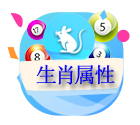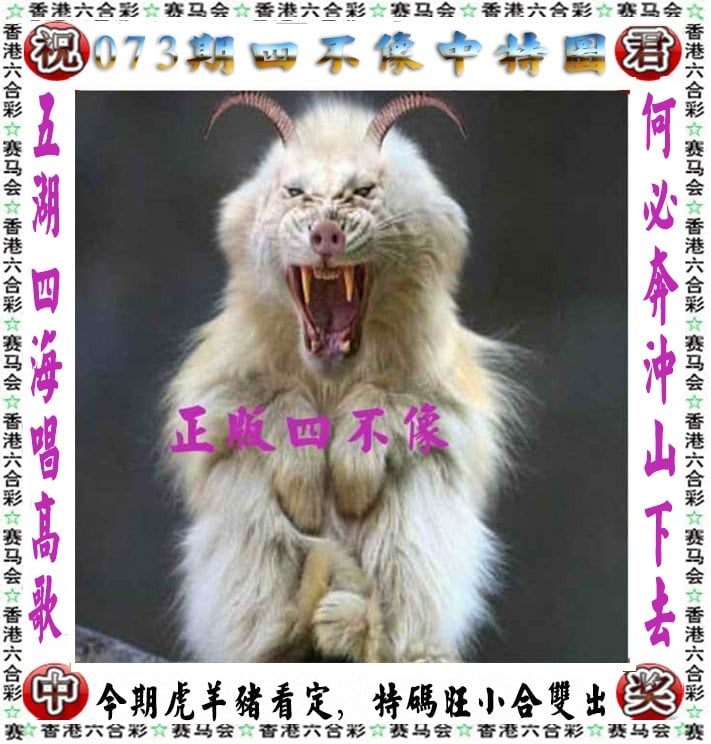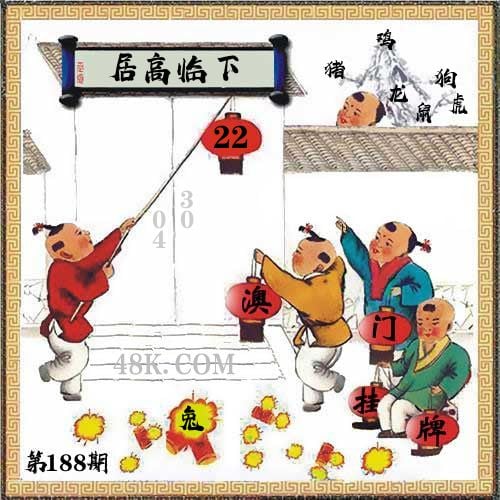
|
188期 | |
|---|---|---|
| 挂牌 | 22 | |
| 火烧 | 兔 | |
| 横批 | 居高临下 | |
| 门数 | 04,03 | |
| 六肖 | 鸡猪狗龙虎鼠 | |
- 澳门四不像精解
- 香港四不像精解
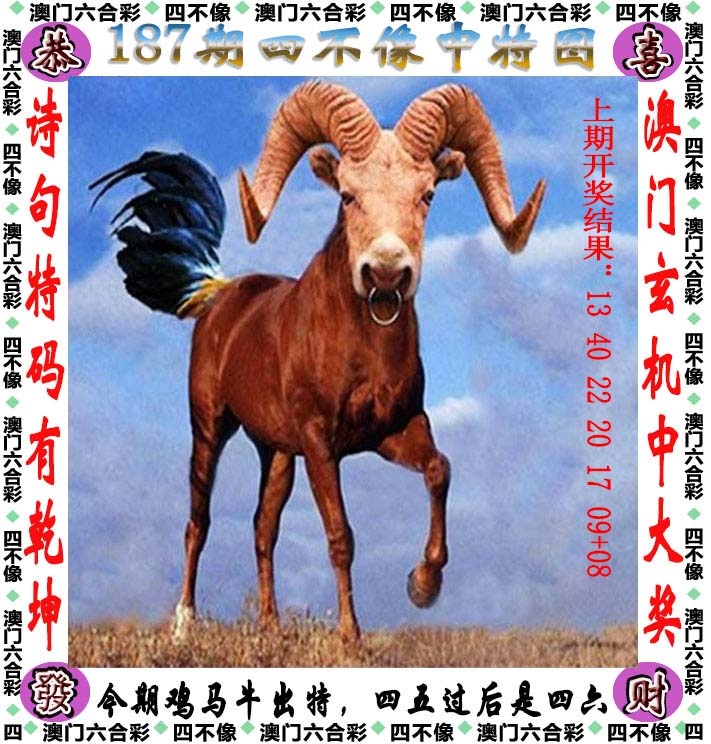
187期今期鸡马牛出特,四五过后是四六开?00准
①杀猴鼠兔(10.22.34.46.06.18.30.42.03.15.27.39)
②图解特肖鸡马牛羊猪
③合双+大数
更多资料尽在澳门一肖一码100准免费资料
- 澳门跑狗图
- 香港跑狗图
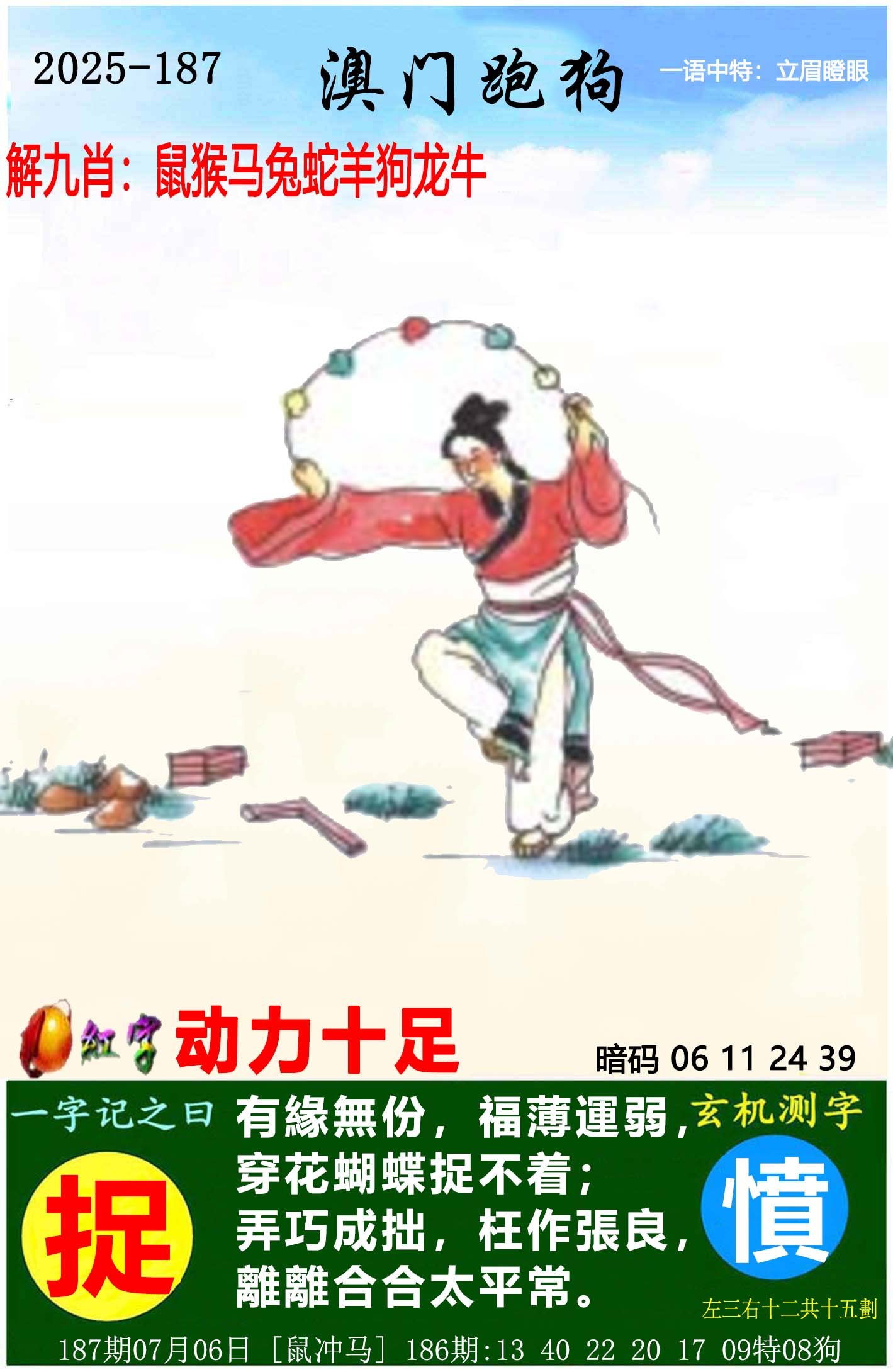
187期跑狗一字記之曰:【捉】
有緣無份,福薄運弱,穿花蝴蝶捉不着
弄巧成拙,枉作張良,離離合合太平常
解:这段文字暗喻人生无常、缘分难留:有缘无份代表机遇稍纵即逝,穿花蝴蝶象征难以把握的福运;弄巧成拙暗示聪明反被误,离合平常道尽世事多变。生肖解法:猴(枉作张良,智谋落空)蛇(如穿花蝴蝶,机敏却难捉)兔(福薄运弱,性情温和)马(奔波离合,聚散无常)鸡(劳碌却徒劳,如弄巧成拙)核心在猴与蛇——智慧与机遇的错位,暗喻人生需顺势而为,莫强求
五肖:猴蛇兔马鸡
四肖:猴蛇兔马
三肖:猴蛇兔
二肖:猴蛇
一肖:猴
185期跑狗一字記之曰:【畫】
指出冬瓜,畫出葫蘆,亂點一通真糊塗
实靠想像,真辦不到!樹根豈可當鬚
解:这几句讽刺做事不切实际、胡乱拼凑——明明照着冬瓜(粗短)画,却画出葫芦(细长),东改西改一团糟(树根当胡须)。用5生肖表达:鼠目寸光(看错目标)、牛唇马嘴(搭配荒谬)、兔角龟毛(虚构不实)、猴戴官帽(滑稽可笑)、猪鼻插葱(装模作样)——空想终究办不成事
五肖:鼠牛兔猴猪
四肖:鼠牛兔猴
三肖:鼠牛兔
二肖:鼠牛
一肖:鼠
184期跑狗一字記之曰:【陷】
利之所在,哪怕犯險?從來慾壑最難填
泥足深陷,一往無前。金銀珠寶誰會嫌
解:这段话的意思是:利益所在的地方,人们哪怕冒险也会去追求,因为人的欲望很难满足。一旦陷入利益的泥沼,就会越陷越深,一往无前。对于金银珠宝这类财富,谁都不会嫌弃。用十二生肖来表达:生肖鼠机灵,为利益不惜冒险;生肖虎勇猛,追逐财富一往无前;生肖龙强大,面对金银珠宝毫不退缩;生肖猴聪明,却也难逃欲望泥潭;生肖鸡敏锐,追逐财富不遗余力
五肖:鼠虎龙猴鸡
四肖:鼠虎龙猴
三肖:鼠虎龙
二肖:鼠虎
一肖:鼠
- 澳门四不像
- 澳门传真图
- 澳门跑马图
- 新挂牌彩图
- 另版跑狗图
- 老版跑狗图
- 澳门玄机图
- 玄机妙语图
- 六麒麟透码
- 平特一肖图
- 一字解特码
- 新特码诗句
- 四不像玄机
- 小黄人幽默
- 新生活幽默
- 30码中特图
- 澳门抓码王
- 澳门天线宝
- 澳门一样发
- 曾道人暗语
- 鱼跃龙门报
- 无敌猪哥报
- 特码快递报
- 一句真言图
- 新图库禁肖
- 三怪禁肖图
- 正版通天报
- 三八婆密报
- 博彩平特报
- 七肖中特报
- 神童透码报
- 内幕特肖B
- 内幕特肖A
- 内部传真报
- 澳门牛头报
- 千手观音图
- 梦儿数码报
- 六合家宝B
- 合家中宝A
- 六合简报图
- 六合英雄报
- 澳话中有意
- 彩霸王六肖
- 马会火烧图
- 狼女侠客图
- 凤姐30码图
- 劲爆龙虎榜
- 管家婆密传
- 澳门大陆仔
- 传真八点料
- 波肖尾门报
- 红姐内幕图
- 白小姐会员
- 白小姐密报
- 澳门大陆报
- 波肖一波中
- 庄家吃码图
- 发财波局报
- 36码中特图
- 澳门男人味
- 澳门蛇蛋图
- 白小姐救世
- 周公玄机报
- 值日生肖图
- 凤凰卜封图
- 腾算策略报
- 看图抓码图
- 神奇八卦图
- 新趣味幽默
- 澳门老人报
- 澳门女财神
- 澳门青龙报
- 财神玄机报
- 内幕传真图
- 每日闲情图
- 澳门女人味
- 澳门签牌图
- 澳六合头条
- 澳门码头诗
- 澳门两肖特
- 澳门猛虎报
- 金钱豹功夫
- 看图解特码
- 今日闲情1
- 开心果先锋
- 今日闲情2
- 济公有真言
- 四组三连肖
- 金多宝传真
- 皇道吉日图
- 澳幽默猜测
- 澳门红虎图
- 澳门七星图
- 功夫早茶图
- 鬼谷子爆肖
- 观音彩码报
- 澳门不夜城
- 挂牌平特报
- 新管家婆图
- 凤凰天机图
- 赌王心水图
- 佛祖禁肖图
- 财神报料图
- 二尾四码图
- 东成西就图
- 12码中特图
- 单双中特图
- 八仙指路图
- 八仙过海图
- 正版射牌图
- 澳门孩童报
- 通天报解码
- 澳门熊出没
- 铁板神算图
- 杀料专区
- 独家资料
- 独家九肖
- 高手九肖
- 澳门六肖
- 澳门三肖
- 云楚官人
- 富奇秦准
- 竹影梅花
- 西门庆料
- 皇帝猛料
- 旺角传真
- 福星金牌
- 官方独家
- 贵宾准料
- 旺角好料
- 发财精料
- 创富好料
- 水果高手
- 澳门中彩
- 澳门来料
- 王中王料
- 六合财神
- 六合皇料
- 葡京赌侠
- 大刀皇料
- 四柱预测
- 东方心经
- 特码玄机
- 小龙人料
- 水果奶奶
- 澳门高手
- 心水资料
- 宝宝高手
- 18点来料
- 澳门好彩
- 刘伯温料
- 官方供料
- 天下精英
- 金明世家
- 澳门官方
- 彩券公司
- 凤凰马经
- 各坛精料
- 特区天顺
- 博发世家
- 高手杀料
- 蓝月亮料
- 十虎权威
- 彩坛至尊
- 传真內幕
- 任我发料
- 澳门赌圣
- 镇坛之宝
- 精料赌圣
- 彩票心水
- 曾氏集团
- 白姐信息
- 曾女士料
- 满堂红网
- 彩票赢家
- 澳门原创
- 黃大仙料
- 原创猛料
- 各坛高手
- 高手猛料
- 外站精料
- 平肖平码
- 澳门彩票
- 马会绝杀
- 金多宝网
- 鬼谷子网
- 管家婆网
- 曾道原创
- 白姐最准
- 赛马会料
/。(ICP备案号)
友情链接:百度
网站的广告和外链,所有内容均转载自互联网,内容与本站无关!
本站内容谨供娱乐参考,不可用于不法活动,严禁转载和盗链等!并且防止相关欺骗性内容。
Copyright ©2012 - 2025 / All Rights Reserved





